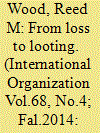|
|
|
Sort Order |
|
|
|
Items / Page
|
|
|
|
|
|
|
| Srl | Item |
| 1 |
ID:
134983


|
|
|
|
|
| Summary/Abstract |
Research into the causes of civilian abuse during civil conflict has increased significantly in recent years, yet the mechanisms responsible for changes in actors' tactics remain poorly understood. I investigate how the outcomes of discrete conflict interactions influence subsequent patterns of rebel violence against civilians. Two competing logics suggest opposite influences of material loss on violence. A stylized model of rebel-civilian bargaining illustrates how acute resource demands resulting from recent severe conflict losses may incentivize insurgent violence and predation. I also identify several factors that might condition this relationship. I evaluate hypotheses based on these expectations by first analyzing the behaviors of the Lord's Resistance Army using subnational conflict data and then analyzing a cross-sectional sample of post–Cold War African insurgencies. Results from both the micro- and macrolevel analyses suggest that rising battlefield costs incentivize attacks on civilians in the period immediately following the accrual of losses. However, group-level factors such as effective control over territory and the sources of rebel financing condition this relationship. The findings suggest potential benefits from examining the interaction of strategic conditions and more static organizational characteristics in explaining temporal and geographic variation in rebel violence.
|
|
|
|
|
|
|
|
|
|
|
|
|
|
|
|
| 2 |
ID:
136008


|
|
|
|
|
| Summary/Abstract |
The CH-47 chinook has been the stalwart of global military heavy-lift operations for decades. Jamie Hunter analyses the helicopter’s service life and future upgrade programme.
|
|
|
|
|
|
|
|
|
|
|
|
|
|
|
|
| 3 |
ID:
135814


|
|
|
|
|
| Summary/Abstract |
What makes soldiers fight? This question has interested historians since the dawn of war itself. The contributions of anthropology, psychology and sociology to the study of combat in the twentieth century have greatly deepened our understanding of morale and combat motivation. The publication of John Keegan’s seminal The Face of Battle in 1976, together with an upsurge of oral history, has stimulated a generation of scholarship on what Paul Kennedy has called ‘war from below’: individuals' experience of fighting.1 As a result, we know better than ever before what put the average soldier in his slit trench and kept him there.2 What remains poorly understood, however, is the connection between individuals' combat motivation, the morale of a unit or formation, and success and failure on the battlefield.
|
|
|
|
|
|
|
|
|
|
|
|
|
|
|
|
| 4 |
ID:
136642


|
|
|
|
|
| Summary/Abstract |
Pakistan has introduced a new battlefield nuclear weapon, Nasr, into its arsenal. Nasr, a short-range ballistic missile, was first flight-tested in 2011. Pakistani leaders have declared that the weapon is meant to deter India from executing its Cold Start war doctrine. The doctrine was conceived by members of India's army and its strategic community in 2004 as a solution to perceived operational shortcomings of the army in responding to major terrorist incidents involving Pakistanis. It recommends the positioning of smaller army units at the international border with the capability to rapidly invade Pakistan and occupy narrow slices of territory, while denying Pakistan the ability to anticipate the attack and to immediately assemble a counterattack force. The Cold Start war doctrine, however, has since been publicly disavowed by the Indian government, and the Indian army has not reorganized or equipped its troops in a manner consistent with the doctrine. Further, the use of battlefield nuclear weapons inside Pakistan or near the densely populated border regions could potentially cause civilian casualties in the tens of thousands. These factors should dissuade Pakistan from deploying the Nasr missile.
|
|
|
|
|
|
|
|
|
|
|
|
|
|
|
|
| 5 |
ID:
134232


|
|
|
|
|
| Summary/Abstract |
It was October 2009, just days after a brazen Taliban attack on a remote American military base in eastern Afghanistan killed eight of the 53 members of his unit and wounded 27 others. The trim 29-year-old had hauled ammunition to pinned-down U.S. troops and killed close to a half-dozen Taliban fighters. His acts of bravery helped keep the tiny base from being completely overrun and later earned him the Medal of Honor, the U.S. military's highest commendation. Carter didn't feel like a hero, however. Alone at night, tossing and turning in his bed, he couldn't escape the sounds of that fateful firefight and the sight of Spc. Stephan Mace -- immobilized after his legs had been blown away -- begging for help, tears streaming down his dirt-covered face. Carter had raced across the battlefield and treated the 21-year-old's wounds, but, ultimately, Mace died during surgery just hours later. Carter felt that he had failed his comrade; if only he'd moved faster, he thought, Mace would have lived. And though Carter's platoon sergeant encouraged him to feel proud about having helped save other troops, "I couldn't really hear him," he said during a recent speech in Maryland. "I was more focused on getting to my bunk, burying my head into a pillow, and not existing. I wanted to find a deep hole and just disappear."
|
|
|
|
|
|
|
|
|
|
|
|
|
|
|
|
|
|
|
|
|